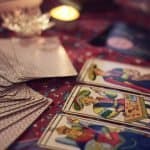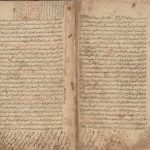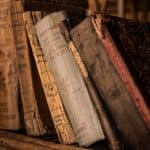Bibliomancy is an old practice that has amazed and attracted many seekers over the centuries. Its attractiveness stems from its simplicity and accessibility since all you need is a book, an open mind, and an element of curiosity.
The word “bibliomancy” derives from the Greek words “βιβλίον” (biblion) meaning “book” and “μαντεία” (manteía) meaning “divination”. All together “divination from books”. So, bibliomancy is divination performed with books.
It is a type of fortune-telling that entails randomly opening a book and interpreting the words or paragraph that one’s finger falls on.
Bibliomancy has a lengthy history and has been used by many nations and belief systems over the years. It is frequently connected with spiritual or mystical practices and is used to seek direction or insight from a higher power or the cosmos. However, bibliomancy may also be utilized as a creative writing prompt or source of inspiration.
Other types of book divination, such as Stichomancy, Libromancy, and Rhapsodomancy, are often used interchangeably with Bibliomancy.
Stichomancy is formed from the Greek terms “Στίχος” (stichos), which means “verse” or “line,” and “μαvτεία” (mantea), which means “divination.” It includes figuring out what random lines or sentences in a book mean, often by flipping pages or closing one’s eyes and pointing. Stichomancy enables a more concentrated examination of particular verses, providing a clear and specific insight that corresponds to the seeker’s inquiry or goal.
Libromancy is a broader method that stems from the Latin term “liber” (meaning “book”) and the Greek “μαντεία” (mantea) meaning “divination.” It entails the interpretation of complete books or sizable portions of literature, enabling the seeker to get fully immersed in a larger story or context.
Rhapsodomancy comes from the Greek word “Ραψῳδία” (rapsoδía) meaning “epic poem”, “song,” or “ode,” and “-mancy”, meaning divination, as we said previously. It dates back to the ancient Greeks, when oracle passages were written for random consultation in sybilline books or a passage from one of the poets was chosen for guidance.
Sortes Virgilianae, Sortes Homericae, and Sortes Biblicae are different Latin terms for the same concept, which refers to the act of seeking guidance by randomly choosing a passage from Virgil, Homer, or the Bible.

Bibliomancy is essentially all divination methods that involve books, much as cartomancy is all divination methods relating to cards (tarot, oracle cards, etc.).
Traditionally, the Bible was used for bibliomancy; however, these days, any book can be used. Bibliomancy is just letting your intuition lead you to a line, section, or even an entire chapter of a book that will answer the question you have presented.
Just because bibliomancy is simple and doesn’t require any special equipment doesn’t imply it’s completely uncomplicated. The fact that interpretation is so incredibly subjective might be an issue. There are no conventional interpretations, no guidebooks, and no common symbolism from which to draw. It’s just you and the book, attempting to understand whatever paragraph you came upon in the context of your query. In certain circumstances, this can be extremely simple! Other times, you might end up with texts that don’t make much sense in the context of your question.
It’s alright; mastering a new skill takes time, and as you get experience with this type of divination, you’ll figure out your own interpretation methods that suit you the best.
Read on to learn more about the history of bibliomancy, the books you can use, and traditional and modern methods to perform it.
Check out our recommendations at “Occult Bookshelf” and many free resources at our “Free Library“
History of Bibliomancy
It’s hard to say exactly when the first recorded use of Bibliomancy happened. According to the Oxford English Dictionary, the term “bibliomancy” was first used in 1753. However, bibliomancy as a practice is believed to have existed since written language was developed and humans sought connection.
The practice dates back to the Roman and Greek civilizations, and maybe much earlier. For example, we know that Ancient Egyptian magick practitioners used the Book of the Dead to get ideas for spells when they were sick, hurt, or needed help.
The Romans used the term “sortes,” which was an early term for bibliomancy that comprised selecting a single line or verse from a book. The usage of Virgil’s Aeneid (1) was widespread and referred to as the “sortes Virgilianae,” whereas the use of the Iliad and Odyssey was referred to as the “sortes Homerica.” Sometimes people used fasting and prayer as an approach to getting ready for using the divine oracles.
Although it started in the Roman Empire, bibliomancy became popular throughout Europe and the Middle East during the Middle Ages. Not just laypeople, but even clergy and church leaders used it.
The Bible is the most frequently utilized book among Christians (in the “Sortes Sanctorum” and “sortes Biblicae”). The Council of Vannes, in 465 a.d. (2), outlawed bibliomancy under penalty of excommunication, as did the Councils of Agde and Orleans in the next century. It did, however, continue to be practiced by Kings, Bishops, and Saints for decades after that.

It was occasionally employed during bishop consecrations and was obviously taken from the pagans, who frequently derived prognostications from the writings of Homer and Virgil.
It has long been a practice in the Gallican Church to choose bishops by having children draw text-filled slips of paper on behalf of each candidate, with the choice being made based on whatever text was seen to be most favorable. This practice was prevalent in the Greek Church during the consecration of Athanasius, for whom the presiding prelate, Caracalla, archbishop of Nicomedia, opened the Gospels with the words, “For the devil and his angels.”
When the bishop of Nicaea saw them, he quickly switched to another passage, which was read aloud: “The birds of the air came and lodged in the branches thereof.” However, with this particular part being meaningless, the former eventually came to light, leading to significant agitations and catastrophic divides.
Saint Francis of Assisi employed bibliomancy before making any significant choices. Guibert of Nogent wrote about a time when a monk used bibliomancy to find out what kind of abbot Guibert would be when he first went to his new abbey.
Saint Gregory of Tours also mentions a few incidents of bibliomancy in book five, chapter fourteen of the History of the Franks (3). In that part of the book, Gregory uses bibliomancy after the son of a king asks for spiritual help. Later, the same prince used bibliomancy to predict his own destiny. But he only does it after three days of fasting and prayer.
Bibliomancy played an important role in Saint Augustine of Hippo’s conversion to Christianity. In the midst of a personal crisis, Saint Augustine repeatedly heard a child’s voice shouting, “Pick it up; read it; pick it up, read it” (From the Latin, “Tolle Lege, Tolle Lege”).
The first verse he came across was Romans 13:13–14, which says, “Not in rioting and drunkenness, not in chambering and wantonness, not in strife and envying, but put on the Lord Jesus Christ, and make no provision for the flesh to fulfill the lusts thereof.”(4) Interestingly, Saint Augustine would write in chapter twenty of his fifty-fifth letter how much he detested bibliomancy and that he believed no one should practice it, but that reading the gospels to predict the future was preferable to consulting demons.
The Qur’an and Hafez poems are the most frequently utilized texts in Islamic civilizations. During the Talmudic era, and continuing into the Middle Ages, it was customary to interpret a verse chosen at random and recited by the schoolchildren as portending good or bad luck. At the end of the seventh century, Christians followed the same practice.
When a person was very ill, the Pentateuch was opened, and the first name that caught the eye was appended to the patient’s name in order to prevent the dreadful fate (see Shinnuy ha-Shem)(5). The words at the start of a Bible page that were randomly opened or touched with the thumb at the opening were also widely employed as an oracle.
A type of bibliomancy used by Jews involved appealing to the first words heard from anyone reading the Scriptures and treating them as a voice from heaven. As an example, consider the following: Rabbi Acher, who had committed several crimes, was brought into thirteen synagogues, where a worshiper read a passage, and the passage he read was examined.
The prophet Isaiah’s words were read in the first synagogue: “There is no peace for the wicked” (Isa 48:22); in another, the Psalmist’s words were read: “Unto the wicked, God saith, What hast thou to do to declare my statutes, or that thou shouldest take my covenant in thy mouth?” (Ps 50:16). After hearing similar passages against Acher in all the synagogues, it was assumed that he was rejected by God!
The popularity of bibliomancy skyrocketed in sixteenth-century Iran and Turkey. For the nobles of the time, the Falnama, or Book of Omens, had many of the answers they were looking for when they asked about the future.
This collection of figurative paintings, writings, and magical recipes was used to predict the future; all that was required was to say a prayer, ask a question, and then let the book open at random. The solution was displayed in the form of an image and statements on the appearing page, and it was open to several interpretations.
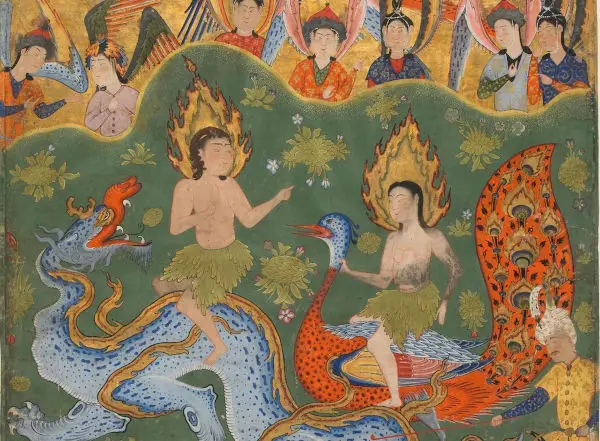
Moreover
- In the past, the Bible was consulted on New Year’s Day by the common people of England and Scotland. Each member of the household, prior to eating, would walk up to the Bible, open it at random, and place his finger on a verse, with that verse predicting his fortune for the coming year.
- Weighing someone against the Church’s great Bible was one way to determine their guilt or innocence during the Great Witch Hunt. If the individual weighed less than the Bible, she was innocent; of course, if the Bible weighed more than she did, she was condemned.
- The Bible was placed beneath the pillows of young people, with a sixpence slipped under the book of Ruth, to give them dreams of marital divination.
- In some places in Scotland, Bible pages were used to fan the sick, and a Bible was placed under the heads of women who had just given birth and in the beds of newborn babies.
- The “key and book” method of Bibliomancy to ascertain guilt in a crime remained in use in some rural areas of Britain as late as the nineteenth century. A key was put at random inside the pages of the Bible as part of that method. The suspects’ names were scribbled on little pieces of paper and slipped inside the key’s hollow end. When the paper with the name of the guilty was put in, the Bible would fall out of the hands of the person holding it.
- To ascertain the condition of their souls or their course of duty, some well-intentioned Protestants engage in a form of bibliomancy. It was common among Moravians, coupled with the usage of lots, and John Wesley used it occasionally.
Lesser known Historical Bibliomancy Books
Ancient prophecies allegedly made by prophetesses in various nations were the Sibylline Books. They were consulted during crises and were revered in Roman religion, guarded by priests known as Quindecimviri. Much of the original collection was destroyed, although parts, including the oldest known volumes 3-5, were most likely produced in Alexandria by Jewish writers.
Sortes Astrampsychi is a lesser-known type of Bibliomancy from the Byzantine era. It entailed consulting a book called “Astrampsychus” to learn about one’s fate and fortune. Practitioners choose sections from this book at random to understand and gain insight into their own lives. The Astrampsychus’ origins and authorship are unknown, but it became popular in the Byzantine Empire as a way for individuals to seek direction and knowledge of their fates.

Books to Use in Bibliomancy
The first step in Bibliomancy is to find a book that speaks to you. It may be a personal favorite, a spiritual work, or any book that means anything to you. According to the majority of practitioners, this is the secret to successful bibliomancy. Because interpretations are so unique, the tools you utilize should be as well.
Sacred books contain old wisdom passed down through the centuries. Many people see Sacred Texts as God’s message or a channel for heavenly inspiration. By using these books in bibliomancy, you can open yourself up to a direct link with the divine and get advice from a higher power.
Here are a select few Sacred Texts that you could use for bibliomancy:
- Bible
- Quran/Koran
- I Ching
- Talmud
- Tanakh
- Avesta
- Bhagavad Gita
- Torah
- Book of the Dead
- Pāli Canon
Using these books for spiritual guidance is acceptable since they reflect the holy word of God, unlike other types of divination such as Tarot cards and spirit boards.
The Book of Psalms, in particular, appears to be a popular instrument for bibliomancy. This is not limited to Christians; many practitioners of African traditional religions and hoodoo have a copy on hand for inspiration and divinatory insight.
Old family Bibles, which are frequently inscribed with birth and death dates, are said to be extremely potent when it comes to bibliomancy.
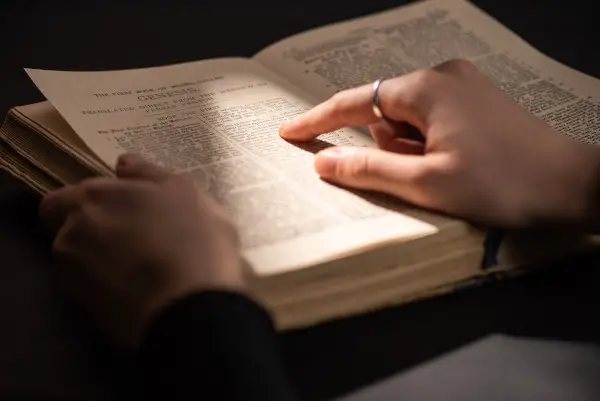
But to practice bibliomancy, you do not need to be religious, and practically any literature may be utilized as long as you have a connection to it.
For instance, here are some suggestions for books that you can use for bibliomancy.
- Homer’s Odyssey and Iliad
- Harry Potter series.
- The Art of War by Sun Tzu
- Meditations by Marcus Aurelius
- Manual of the Warrior of Light by Paulo Coelho
- self-help books
- mythology collections
- and so on…
My personal best is the book “Meditations” by Marcus Aurelius, and I use it any time I want some inspiration. The Art of War by Sun Tzu is my second choice when I need something more straightforward.
Forming a link, or connection, with your book is vital if you want accurate readings, just like it is with tarot cards. Reading your favorite book is one way to do this. In fact, the finest books for bibliomancy are those that you truly enjoy and have read numerous times, as you already have a connection with them. A connection is made through the process of reading a book.
How to Perform Bibliomancy
There are several methods for performing bibliomancy on your own. However, one component that appears to be common is that you should have a question in mind. Of course, you can use it for inspiration only.
The simplest method requires only the book of your choice. Once you’re ready, find a place to sit where you won’t be disturbed. Hold your book in your hands and take long breaths to center yourself and get grounded. Close your eyes and concentrate on the subject at hand. It could be a simple yes-or-no question, or it could be more in-depth. Make sure that whatever it is is the only thing on your mind.
When you’re ready, turn to any page in the book. Open your eyes. The answers to your questions should be in the first words you read. Some people prefer to point to a random location on the page and see what words are at their fingertips, whereas others prefer to simply observe which passages capture their attention first. Choose whatever seems best for you.
In a similar way, the bibliomancer opens the book exactly in half and puts it out in the open so that the wind can move the pages and decide which page will be used for interpretation.
In a different approach, you pick a book at random from a library and then pick a random page from that book. This is also true if a book falls off a shelf on its own. Run your fingertips softly down the spines of books on your shelf or at the library. Slowly move on, and when inspiration strikes, pause. You could use that book. This approach can give a broader view.
Because book owners often have favorite sections that the books automatically open to, some practitioners use dice or another randomizer to choose which page to open. This process became standardized through the use of coins or yarrow stalks while consulting the I Ching. Tarot can also be seen as a sort of bibliomancy, with the major difference being that the cards (pages) are not bound.
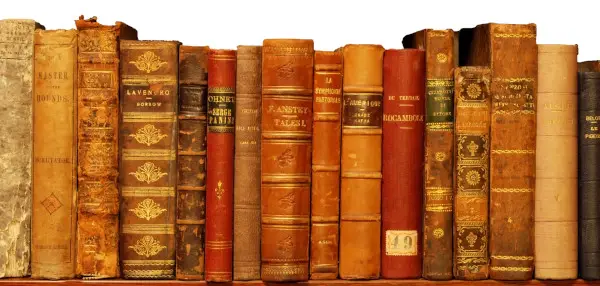
Here, I want to introduce you to another method. This time, we will not use physical books but digital ones. You can access most books that are suitable for bibliomancy through our “Bibliomancer” app. Imagine having an entire bookshelf in your hand.
Just type in the book you want to use. Follow the ritual as you would with physical books and click the button. A random verse from your favorite book will appear with some general interpretation to guide you.
You can save “Bibliomancer” to your favorites, and whenever you need guidance or inspiration, use it. Of course, it is free.
Now you need to figure out how the words you chose connect to your question. There will be instances when the answer comes to you instantly and you know precisely what it means with no need for interpretation. When it’s not so easy, use the steps below to dig deeper into your bibliomancy texts.
Reread the passage, but this time, highlight or underline any words, phrases, or lines that stand out to you. This time, you’re just reading through and letting your brain tell you what’s important. Don’t overthink everything; instead, try to follow your gut and go with the flow.
If you’re currently working on the original book, mark them or copy them onto a different piece of paper.
If you’re still not sure how to understand the information, it’s okay to put it down for a while. The subconscious mind is very good at making links and finding meaning in the world around us. Sometimes, we just need to get the conscious mind out of the way so that the subconscious mind can do its job. If you’ve spent time focusing on your text, identifying key portions and features, as well as the symbolism they may contain, and it still doesn’t make sense, put it down. Set your notes aside and don’t think about them until at least the next day.
Between now and the time you return and attempt to understand the response you received, you need to get some sleep. While we sleep, our brains perform an incredible amount of work processing information and developing new connections and understanding from what we’ve taken in throughout the day. Use this process to your advantage.
All you have to do is think about the bibliomancy reading right before bed. You can also reread your notes before bed if that helps, but don’t spend a lot of time trying to figure it out with your conscious mind. Just think about it before you go to sleep and trust that your subconscious will work on it while you’re sleeping. Return to the section you’re working on understanding with fresh eyes the next morning, or possibly later in the day, and see what you find.
Trust and openness are essential for successful Bibliomancy reading. Follow this practice with an open mind and heart, letting the words and images help you tune into your intuition and give you useful direction. Accept the synchronicity and unexpected opportunities that emerge from the pages of the books you choose.
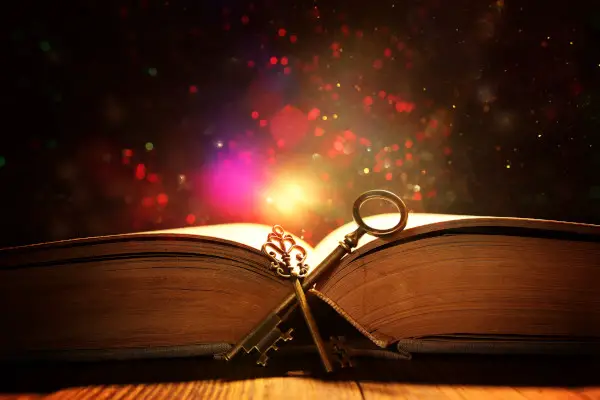
Using Sacred Books
If you wish to utilize the Bible or any sacred book, remember that because the Bible is a sacred book, the querent is urged to treat it with respect. Questions about trivial topics are discouraged. The divination begins with a brief prayer, either silently or vocally, performed by the questioner. The next step is to ask a clear inquiry, either aloud or silently. Next, a random page from the Bible is opened in anticipation of finding an answer there.
The eyes often remain closed while opening the Bible. Once the page is chosen, the person asking the question lets his or her index finger move in slow circles or figure eights until Spirit tells them it’s time to stop. After that, the eyes are opened and the passage is read.
In general, if the verse chosen is positive, the response to the question is positive, and if the verse of scripture is negative, the answer is negative.
Check out our recommendations at “Occult Bookshelf” and many free resources at our “Free Library“
Bibliomancy in Literature and Modern Fiction
Bibliomancy, an ancient method of seeking answers or direction by randomly picking and interpreting passages from books, has been included in a number of contemporary fiction and works of literature. The following are some examples:
- The character of Santiago in Paulo Coelho’s “The Alchemist” employs bibliomancy to seek guidance and inspiration for his journey by reading a book he discovers at a marketplace.
- In Jules Verne’s “Michael Strogoff” (1876), Feofar Khan sentenced Michael Strogoff to blindness after randomly pointing in the Koran at the words “And he will no longer see the things of this earth.”
- Every important character in Philip K. Dick’s book “The Man in the High Castle” practices bibliomancy, mostly through casting yarrow stalks along with the I Ching. Reportedly, Dick himself used this method to determine crucial plot elements, even blaming the I Ching for plot developments he disliked.
- Erin Morgenstern’s “The Night Circus”: A strange circus emerges only at night in this intriguing story, and the participants frequently seek answers from a rare book in the circus called “The Book Without End.” The book is claimed to provide knowledge and insight into the future, and the main characters seek its advice in their pursuits.
- “Good Omens” by Neil Gaiman and Terry Pratchett: In this comic fantasy story, a witch named Anathema Device deciphers the events leading up to the Apocalypse using a book of prophecies passed down through her family for centuries. The book is crucial to the storyline since the characters rely on it to understand their fates.
- Barry McCrea’s novel “The First Verse” follows the narrative of Niall Lenihan, a student who joins a ‘cult’ whose members utilize sortes for guidance.
- “The Shadow of the Wind” by Carlos Ruiz Zafón: This captivating story follows Daniel, a young boy who finds a mysterious book by Julian Carax titled “The Shadow of the Wind.” The book has had a great impact on Daniel’s life and the lives of others around him, pushing him on a mission to discover the secrets behind the book and its mysterious creator.
- Django Wexler’s “The Forbidden Library”: In this young adult fantasy series, the main character, Alice, realizes she has the magical power to enter books and engage with their stories. She comes across perils and mysteries as she investigates these magical books, and the books themselves appear to be guiding her on her quest.
These examples demonstrate how bibliomancy can be an intriguing and mysterious aspect of literature and modern fiction, bringing depth and mystery to stories and the adventures of the characters.
End Words
Bibliomancy is a great instrument for self-reflection, insight, and inspiration since it is an accessible method of divination in which you can pick any sort of book that bears importance to you. With its origins in ancient cultures, the art of bibliomancy encourages us to access accumulated knowledge spanning generations and offers us priceless insight into our own individual path.
When you don’t feel comfortable asking a friend or loved one for help, you may use bibliomancy to get answers in complicated and ambiguous circumstances. It also offers a novel method for discovering hidden facts and supports critical thinking. Bibliomancy is an invitation to journey through time, experience the written word in a completely renewed way, and connect with your particular inner direction and intuition.
Practically speaking, you only need a book that resonates with you; no specialized skills or expertise are needed. It might be anything from your favorite childhood book to the Torah or another important text.
I wish you many discoveries, wisdom, and a strong connection to the information and insights that lie ahead on this trip into bibliomancy.
| Book Mentioned in the Article | Check Price | Free |
|---|---|---|
| “Meditation”s by Marcus Aurelius | Buy* | |
| “The Odyssey“ by Homer | Buy* | |
| “The Iliad” by Homer | Buy* | |
| “The Egyptian Book of the Dead” | Buy* | |
| “The Aeneid” by Virgil | Buy* | |
| “Falnama – The Book of Omens” | Buy* | |
| “The Art of War” by Sun Tzu | Buy* | |
| “Manual of the Warrior of Light” by Paulo Coelho | Buy* | |
| “The Alchemist” by Paulo Coelho | Buy* | |
| “Michael Strogoff” by Jules Verne | Buy* | |
| “The Man in the High Castle” by Philip K. Dick | Buy* | |
| “The Night Circus” by Erin Morgenstern | Buy* | |
| “ Omens” by Neil Gaiman and Terry Pratchett | Buy* | |
| “The First Verse” by Barry McCrea | Buy* | |
| “The Shadow of the Wind” by Carlos Ruiz Zafón | Buy* | |
| “The Forbidden Library” by Django Wexler | Buy* |
Sources:
- Aeneid of Virgil: https://www.gutenberg.org/files/22456/22456-h/22456-h.htm
- https://www.biblicalcyclopedia.com/V/vannes-council-of-(concilium-veneticum).html
- History of the Franks: http://ia800503.us.archive.org/29/items/historyoffranks01greg/historyoffranks01greg.pdf
- Saint Augustine of Hippo’s conversion to Christianity: https://earlychurchhistory.org/beliefs-2/the-conversion-of-saint-augustine/, http://www.augnet.org/en/life-of-augustine/in-italy/1109-moral-conversion/
- Shinui Shem: Changing the Name of One Who is Ill: https://outorah.org/p/119405/
- Brand’s popular antiquities of Great Britain: https://ia800205.us.archive.org/18/items/cu31924027937949/cu31924027937949.pdf
Stay in Touch
 Join our newsletter by using the forms on this website or click here!
Join our newsletter by using the forms on this website or click here! Follow us on Google News
Follow us on Google News Follow us on Facebook
Follow us on Facebook
Featured Image from Depositphotos



